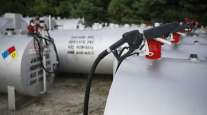Effects on Diesel Prices, Supply Unclear After Purchases of Two Pa. Refineries
This story appears in the May 7 print edition of Transport Topics.
With two major developments in the fuel-supply situation in the Northeast last week, their effects on diesel prices and availability was unclear.
Delta Air Lines said on April 30 it would pay $180 million to buy the shuttered Trainer oil refinery near Philadelphia from owner Phillips 66 Co. in a bid to cut its aviation fuel costs and assure a more reliable fuel supply.
That same day, pipeline operator Energy Transfer Partners LP agreed to pay $5.3 billion to buy a different Philadelphia-area refinery, pipelines and service stations from Sunoco Inc. Sunoco still owns a third refinery in the area that is not part of this deal but also is scheduled for closing.
The Department of Energy warned two months ago that refinery closings in the Northeast could squeeze diesel supply and prices there (3-5, p. 1).
One question is how much diesel fuel might come out of the Trainer plant.
Delta said last week it’s buying the plant to produce jet fuel for its New York-area operations. While Delta hasn’t said what products other than jet fuel will be produced there, the airline struck a deal with Phillips 66 and BP PLC to sell the other output, which results from refining crude oil but that can’t be converted into jet fuel.
Phil Flynn, an analyst at PFGBest Research, doubted that restarting Trainer will boost the supply of diesel.
“If you’re an over-the-road trucker, you’re not going to be in real good shape” because of the sale, Flynn said, explaining that both diesel and jet fuel come from the same part of the refining process. “Most of the diesel, of course, is going to be gone for jet fuel.”
Flynn said gasoline supplies, which come from a different stage of refining, should be supplemented by Delta’s move.
However, John Felmy, chief economist for the American Petroleum Institute, told Transport Topics that Delta’s move could be “a positive sign in terms of supply in the Northeast” because reopening the Trainer refinery could enhance the region’s refining capacity.
The Sunoco sale includes the Marcus Hook refinery, which has been closed since September. Its Philadelphia refinery, which is slated to be closed this summer, is excluded from the sale because it’s the subject of talks between the company and private equity company Carlyle Group.
Delta’s purchase was “driven somewhat by the alarming rate of shutdowns” of refineries in the northeastern United States, President Ed Bastian told Bloomberg News.
“The additional loss of volumes [from refinery shutdowns] and reduced access to distribution systems may create temporary, localized shortfalls,” the Energy Department said in a report in late February.
API’s Felmy explained that the refineries in the Northeast play an important role, supplying 60% of the region’s petroleum products, with the balance coming from petroleum refined elsewhere and moved through pipelines.
Flynn said the acquisition announcements last week are a sign of restructuring in the transportation of diesel, which should drive down diesel prices eventually.
“We need better transportation — getting diesel where it needs to go,” Flynn said. “With Delta doing its own jet fuel, I think we’re going to see more focused production.”
“We have a company [Energy Transfer] with money behind it that’s going to be able to do a better job of moving the diesel from point A to point B,” Flynn added.
“Pipelines are everything right now,” he said, because the primary challenge in the restructuring of fuel markets “is getting oil where it needs to be.”
Delta said in a statement announcing the Trainer purchase that, in addition to the sale price, the airline will spend up to $100 million to maximize the refining capacity for jet fuel.
Delta said the refinery’s jet fuel output would be 32% of total daily capacity compared with its existing jet fuel capacity of 14%, the New York Times reported.
The airline is also getting $30 million in job preservation funds from the state of Pennsylvania to defray purchase costs and reopen the Trainer facility, which was closed in September.
Analyst Ray Neidl at Maxim Group in New York told Bloomberg News the moves could save the airline $300 million a year in refining costs that are part of its $11.8 billion fuel bill.
Energy Transfer has spent a total of $12.6 billion in 13 months to buy rival pipeline operators, including Sunoco, Bloomberg News reported.
Cory Garcia, an analyst at Raymond James & Associates Inc. in Houston, told Bloomberg that keeping the Trainer plant closed might have been a better outcome for the oil industry, which is adding refining capacity outside the United States.
“What you need to see is these less-profitable refineries come out of the market, shut down in order to rationalize or balance the overall supply-demand equation,” said Garcia.
Felmy also said that there is excess capacity in U.S. refineries, which has given those producers the opportunity to sell diesel in Europe, where diesel prices and demand are higher.




